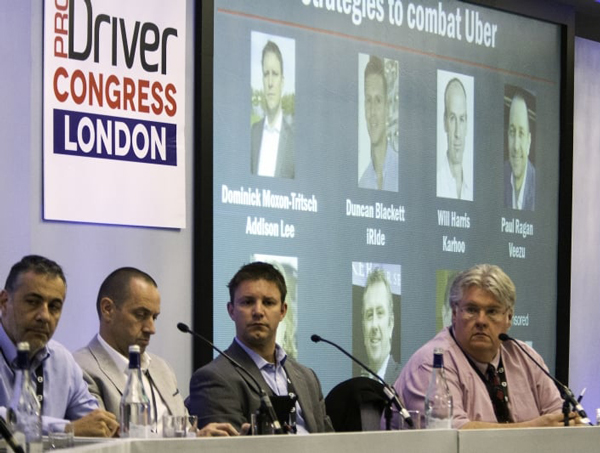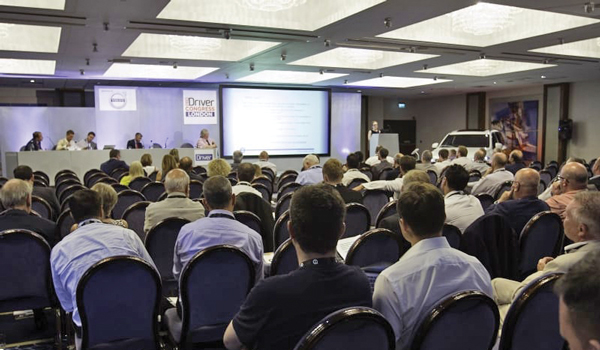 A panel discussion, including Congress Chairman and Professional Driver Editor Mark Bursa (far right), addressed strategies to combat Uber
It was a full day of education and industry updates when Professional Driver magazine’s Congress London debuted July 19. An attendance of exclusively private hire and chauffeured car operators that largely comprised London-area companies came together for the inaugural event held at the Heathrow Renaissance Hotel. The goal of the day? To discuss the problems most immediately affecting the industry and explore the current opportunities available to it.
The one-day-only event was originally intended as the second annual observation of 2015’s ProDriver Live!, which combined an extensive test drive of industry vehicles with classroom-style learning. But after attendees clamored for a purely informative experience, the ProDriver team gave the people what they wanted and delivered a daylong roster of speakers, seminars, and shared ideas.
A panel discussion, including Congress Chairman and Professional Driver Editor Mark Bursa (far right), addressed strategies to combat Uber
It was a full day of education and industry updates when Professional Driver magazine’s Congress London debuted July 19. An attendance of exclusively private hire and chauffeured car operators that largely comprised London-area companies came together for the inaugural event held at the Heathrow Renaissance Hotel. The goal of the day? To discuss the problems most immediately affecting the industry and explore the current opportunities available to it.
The one-day-only event was originally intended as the second annual observation of 2015’s ProDriver Live!, which combined an extensive test drive of industry vehicles with classroom-style learning. But after attendees clamored for a purely informative experience, the ProDriver team gave the people what they wanted and delivered a daylong roster of speakers, seminars, and shared ideas.
“With Congress London, we’re putting on an event that people can enjoy without all of the commercial pressures and will want to come back to,” says Professional Driver Editor Mark Bursa, who’s also the conference chairman. “Using last year’s feedback from ProDriver Live!, it is purely conferences for the day.”
Some of the United Kingdom’s biggest operators like Addison Lee and Veezu were on hand, as were representatives from the likes of Heathrow Airport and Transport for London (TfL), a local government body responsible for the transport system in Greater London. Additional speakers and panelists who were there to provide their various perspectives of the industry included Karhoo, iChauffeur, iRide, and eConnect.
But these weren’t just conversations that conference-goers were to passively watch and hope to get a word in edgewise in a hurried Q&A session: The audience was encouraged to question the many participating panelists, speak their piece, and walk away with satisfactory explanations if not answers. Keynote Addresses also imparted the wisdom and clarity that operators have been looking for.
With five unique sessions covering a range of topics, concerns, and regulations, each aimed to shed light on the timeliest topics and most prevailing issues of both the market and the times.
 Attendance was strong for the single-day event
The day started off with “New Rules, New Mayor - Is Transport for London Giving Us the Regulation We Deserve?” With the London mayoral seat changing hands, operators are rightfully concerned with how a political shift may affect both the taxi and private hire industries operating within the city.
Attendance was strong for the single-day event
The day started off with “New Rules, New Mayor - Is Transport for London Giving Us the Regulation We Deserve?” With the London mayoral seat changing hands, operators are rightfully concerned with how a political shift may affect both the taxi and private hire industries operating within the city.
The six-person panel—plus two TfL representatives, Peter Blake and Rhona Munck, delivering the Keynote Address—explored the possibility of a new mayor protecting the city’s black cabs by limiting Uber’s expansion, as well as the potential for long-established operators to suffer the consequences of warring transportation factions and loyalties.
The various difficulties resulting from London’s Zero-Emissions Capability requirement were also among the hot topics approached during this kickoff session that explored the many ways that the industry is changing, both for chauffeured car and taxi. The ultimate takeaway was that “regulations must be designed to keep pace with current and future changes in the customer demands, vehicle capability, and technology.”
Next up was the thorn in every above-board operators’ side: Uber. “Strategies to Combat Uber” saw a Keynote Address from Addison Lee’s Dominick Moxon-Tritsch and an operator-heavy panel who were ready to tackle the internationally maligned TNC.
Acknowledging Uber’s meteoric rise and infectious global sprawl, the session’s speakers hashed out ways to effectively respond to its popularity and recognized the difficulty of competing with its seemingly bottomless pockets. With some operators opting for consolidation to increase the size of their fleets, the future of and place for smaller operators were both prevailing concerns.
Additionally, the “self-employed driver” business model and demand for technology that Uber’s continuing rise has revealed were addressed, as were the areas of innovation that traditional operators can capitalize on—and the points of Uber’s weakness that they can exploit.
The third session continued on the TNC theme with the seven-person session “Harnessing Technology to Complete With Uber.” While Uber may have introduced sweeping technological changes to the transportation industry, that same innovation is available to the chauffeured car industry to help them compete, better serve their clients, and further level the playing field. The session explored ways to seize on the ease of apps and integrated booking systems to both streamline work and serve as marketing tools.
While on the topic of technology, aggregators were, of course, a focus of discussion, especially in terms of their potential for helping long-established companies duke it out with the interlopers of TNCs. Operators were also called on to explore ways for developing the tech currently at their disposal, as the possibility of the confluence among operators, aggregators, and suppliers of technology to give rise to a true partnership that would benefit not only the chauffeured car industry but also the safety of the riding public.
Acknowledging Uber’s meteoric rise and infectious global sprawl, the session’s speakers hashed out ways to effectively respond to its popularity and the difficulty of competing with its seemingly bottomless pockets."
After an hour-long lunch, attendees regrouped for “Heathrow Airport—A Relationship for the Future.” With the airport’s own Theo Panayi delivering the Keynote Address, accompanied by three additional featured panelists, conversation about Heathrow’s expansion gave way to a frank discussion of whether or not it fully recognizes private hire’s role in safely transporting VIP customers.
Creating a better environment for those operators who depend on airport work and discussing whether or not the new private-hire parking lot will alleviate capacity issues or just rid the immediate area’s streets of Uber cars were both key features of the session.
With an ongoing conversation surrounding the addition of a third runway at Heathrow—a decision that the business community largely backs—the session inevitably turned to how successfully such an expansion would support a proportionally increased flow of both private-hire and chauffeured cars, and if taxis would should still receive the favorable treatment to which they’ve grown accustomed despite their environmental unfriendliness and only being accessible to those traveling to locales within Central London.
Closing out the day was “An Autonomous Future—The Age of the Self-Driving Taxi.” As the driverless cars predicted for years are starting to see the light of day and hit the roads, it’s more important than ever to consider their impact on chauffeured transportation, and this capstone session aimed to examine if the end is, indeed, in sight for human-operated taxis.
Taking the advent of already autonomous vehicle features—adaptive cruise control, lane departure systems, automatic breaking—plus the rise of Tesla’s electric cars to their natural conclusions, attendees and panelists alike strove to envision the future of driverless cars.
With taxis being a logical starting point for driverless vehicles, the discourse eventually veered into the possibility of Uber adopting the technology. The obvious advantages were also examined, as well as the practical downfalls of safety and security as they relate to autonomous cars.
Professional Driver’s next event will be its third annual QSi Awards, a black-tie gala that recognizes the best of the best in the U.K. chauffeured car and private hire industries, which will be held November 24.
Visit prodrivercongress.com to read more about the inaugural Congress London, or prodrivermags.com for more information about Professional Driver magazine. [CD0916]

